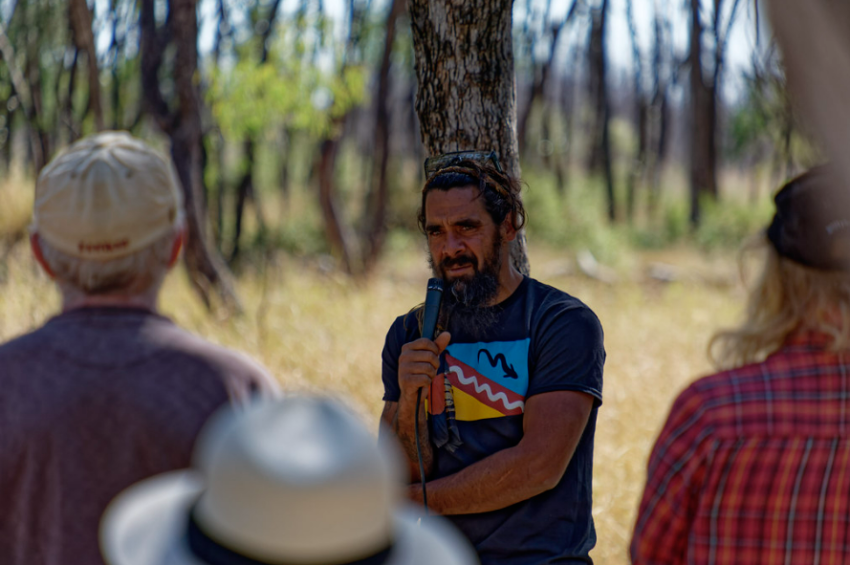
Marking a year since they reoccupied land near Adani’s Carmichael coal mine lease, the Wangan and Jagalingou people in far Western Queensland held a Waddananggu, a Wirdi word for “the talking,” which lasted five days.
“This is a major milestone for Wangan and Jagalingou people,” Wangan and Jagalingou Cultural Custodian Coedie McAvoy told more than 100 activists from around the country on August 22.
“We are going to continue to stay here because now we have come back home. Our old people were removed from this Country, and now we have come back to stay.”
McAvoy said the reoccupation was a step in the fight for First Nations’ land rights and that the Wangan and Jagalingou assert native title rights over the mine area.
It was an inspiring week.
We arrived at the campsite at night, after a four-hour drive from Emerald along dirt roads and culverts. We erected our tents amid the noise of heavy machinery and a new asphalt road that was being built.
The mine is worked 24 hours a day, using huge spotlights at night. Coal has begun to be moved out on the new railway line.
We were shocked by the size of the slag heap along the length of the horizon and just 1.5 kilometres from the camp site.
McAvoy has kept a sacred fire burning at a stone Bora ring, carrying out ceremony on country, under section 28 of the Human Rights Act 2019. This is the first time the act has been used to occupy land.
We heard many stories of people trying to save sacred sites and occupy land, many of which we were mostly unaware of. For instance, last year, a significant stone tool site was destroyed.
Adrian Burragubba, McAvoy’s father, spoke about the 20-year struggle for land rights and against Adani’s coal mine. He has been made bankrupt by Billionaire Gautam Adani, who won a case in the Supreme Court, forcing Burragubba to pay costs.
The Queensland government extinguished the Wangan and Jagalingou Native Title in 2019, allowing Bravus Mining and Resources (formerly Adani Mining) to take their land as freehold.
The custodians called on the Queensland and federal governments to recognise sovereignty and draw up treaties. “We have made our position clear,” Burragubba said on June 24. “We publicly oppose Adani’s Carmichael mine because of its devastating impacts on our human rights as the original custodians of the land — rights we claim without limits.”
Josie Alec, a Kuruma Marthudhunera Custodian from the Burrup in Western Australia, told us about the three-year occupation to protect five important sites, which include petroglyphs, being destroyed by multinational Perdaman’s $4.5 billion fertiliser plant on the Burrup Peninsula.
Work had stopped, but federal environment minister Tanya Plibersek said on August 23 she would not stop the plant going ahead. Three of the five sacred rocks are due to be moved, during construction, to an unknown site. The massive rocks record the history of the last 100,000 years, as written by First Nations’ people.
We heard from DK, a freshwater Yuggera man from Deebing Creek near Ipswich, about a site where 50 children were massacre despite their teacher’s efforts to save their lives. They want to stop AV Jennings from developing 30 hectares of land into a residential site.
Alison Rose from the Queensland Environment Defenders Office spoke about defending First Nations’ rights to undertake cultural practice and state laws and decisions that interfere with this.
Ecologist Juliana Rechetelo spoke about the threatened black throated finch, whose habitat is the land around Wangan and Jagalingou country.
McAvoy said Waddananggu is the extension of the historic 1972 Aboriginal Tent Embassy and he urged the other 367 First Nation clans to occupy their land under any relevant human rights act.